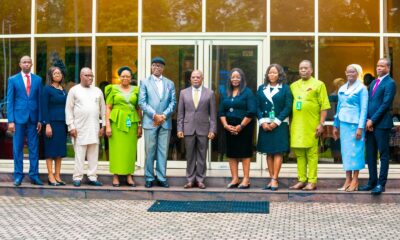Business
ITF Amendment Bill Scales Second Reading
A Bill to amend the Industrial Training Fund ( ITF) Act of 1971, last Thursday in Abuja passed the second reading at the House of Representatives.
The bill also seeks to empower the fund to design, set up and operate guidelines for training and certification.
According to the bill, the training and certification will be done at the states, local governments and the ward levels.
It seeks to establish area registries for maintaining up-to-date registration of certified artisans and technicians in all fields and in all parts of the federation.
Leading debate on the general principles of the bill, Rep. Chudi Uwazurike said the proposed legislation was to expand the scope of manpower by paying attention to entrepreneurship.
He said the bill would also set standards for artisans and technicians.
The lawmaker urged members to support the bill to empower artisans and technicians to develop the economy.
Supporting the debate, Rep. Chris Azubogu said that the bill’s importance could not be over emphasised.
He said it was imperative to standardise the way artisans carried out their activities, to help create manpower and reduce unemployment in the country.
Contributing, Rep. Chris Etta said it would assist “in creating calculated economic improvement”.
Also contributing, Rep.Aminu Shagari said the law was a good one, adding that it would give the teeming youths the opportunity to grow and be self reliant.
However, the bill received strong opposition from some members who felt it would be a duplication of the functions of what some government agencies were empowered to do.
Rep. Aisha Ahmed cited the National Directorate of Employment (NDE) as an agency that organised training programmes like carpentry and others for youths.
Also opposing it, Rep. Shehu Garba said the amendment sought should be an intervention and not to set standards for artisans and technicians.
He suggested that the bill should be an intervention “and not to encroach on roles already carried by existing agencies’’.
Notwithstanding the opposition, the bill scaled through to second reading when put to vote by the Deputy Speaker, Rep. Emeka Ihedioha.
Ihedioha, therefore, referred it to the Committee on Industry for more in puts.
The house also passed for second reading, a bill to amend the Companies and Allied Matters Act of 2004.
The bill seeks to make an upward review of penalties prescribed for foreign companies doing illegal business in Nigeria and non-compliance with the provisions of the act.
The house also passed for second reading, a bill to alter the Constitution of the Federal Republic of Nigeria 1999.
It seeks to vest appellate jurisdiction of Chieftaincy Matters on Sharia Court of Appeal and Customary Court of Appeal of a State.
Business
NCDMB, Dangote Refinery Unveil JTC On Deepening Local Content

Business
Industry Leaders Defend Local Content, … Rally Behind NCDMB

Business
Replace Nipa Palms With Mangroove In Ogoni, Group Urges FG, HYPREP

-
Business19 hours ago
2027: Group Vows To Prevail On Diri To Dump PDP For APC
-
City Crime15 hours ago
RSG Tasks Federal Government On Maternal Deaths
-
News17 hours ago
South-South Contributes N34trn To Nigeria’s Economy In 2024 – Institute
-

 Featured14 hours ago
Featured14 hours agoRivers A Strategic Hub for Nigeria’s Blue Economy -Ibas …Calls For Innovation-Driven Solutions
-

 Rivers17 hours ago
Rivers17 hours agoNDDC Inaugurates Ultra-Modern Market In Rivers Community
-
Opinion19 hours ago
Welcome! Worthy Future For R/S
-
News15 hours ago
Nigeria’s Inflation Rate Dropped To 22.22% In June -NBS
-
News17 hours ago
NOA Set To Unveil National Values Charter — D-G

